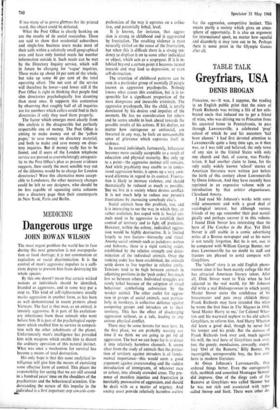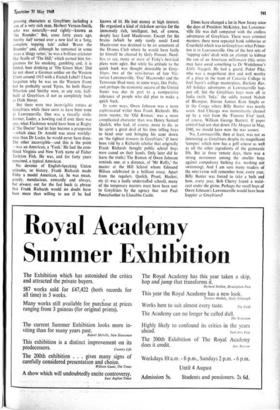Greyfriars, USA
TABLE TALK DENIS BROGAN
Princeton, NJ—It was, I suppose, the reading in an English public print that the niece of
Frank Richards was writing a life of her cele- brated uncle that induced me to get a friend of mine, who was driving me to Princeton from his ancestral home in Pennsylvania, to pass through Lawrenceville, a celebrated 'prep' school of which he and his ancestors `had been alumni.' I had first devoted attention to Lawrenceville quite a long time ago, as it then was, so I was told and believed, the only town of any size in the United States with only one church and that, of course, was Presby- terian. It had another claim to fame, for the only really widely known 'school' stories of American literature were written just before the birth of this century about Lawrenceville by Owen Johnson. And they have recently been reprinted in an expensive volume with an introduction by that arbiter elegantiarum, Cleveland Amory.
I had read Mr Johnson's works with some mild amusement and with a good deal of sociological interest, but although various friends of my age remember their past nostal- gically and perhaps recover it in this volume, I found Dink Stover less interesting than the hero of The Catcher in the Rye. Yet Dink Stover is still usable in a comic advertising series of a Boston newspaper and so his name is not totally forgotten. But he is not, not, to be compared with William George Bunter, nor does Lawrenceville (as no doubt its staff and trustees are pleased to note) compare with Greyfriars.
The 'school' story is an odd English pheno- menon since it has been mainly college life that has attracted American literary talent. After all, Dink Stover went to Yale when he had adjusted to the real world, for Mr Johnson did write a real Bildungsrornan in which young Master Stover earns the confidence of his housemaster and puts away childish things. Frank Richards may have intended this when he wrote the first lines in The Magnet in 1908, `Send Master Harry to me,' for Colonel Whar- ton sent his wayward nephew to his old school. Greyfriars, to reform him. And Harry Wharton did learn a good deal, though he never lost his temper and his pride. But the daimon of Frank Richards took over and, much against his will, the real hero of Greyfriars took over, too; the greedy, mendacious, cowardly, stupid. lazy 'Owl of the Remove,' Billy Bunter, the incorrigible, unimprovable boy, the first anti- hero in modern literature.
At Owen Johnson's Lawrenceville, they ordered things better. Even the outrageously rich, snobbish and conceited Montague Skinner
did improve. One of the dingy cads of the Remove at Greyfriars was called Skinner but he was not rich and associated. with type' called Snoop and Stott. There were other de- pressing characters at Greyfriars including a son of a very rich man, Herbert Vernon-Smith, who was naturally—and rightly—known as `the Bounder.' But, some forty years ago, Smithy half turned over a new leaf in a 'long, complete topping tale' called 'Bravo the Bounder' and, although he remained in some ways a 'dingy rotter,' he was a brilliant cricketer like Scaife of 'The Hill,' which earned him for- giveness for his smoking, gambling and, it is hinted, beer drinking at 'The Green Man.' Did he not shoot a German soldier on the Western Front around 1915 with a French Lebel? I have forgotten why he was on the Western Front but he probably saved Ypres. So both Harry Wharton and Smithy were, at any rate, half- built at Greyfriars if not as completely built as Dink Stover.
But there were two incorrigible rotters at Greyfriars while. there seem to have been none at Lawrenceville. One was a rascally sixth- former, Loder, a howling cad if ever there was one, what Flashman would have been at Rugby if 'the Doctor' had let him become a praeposter —which since Dr Arnold was more worldly- wise than Dr Locke, he would never have done. The other incorrigible—and this had the point —was an American, a 'Yank.' He had the com- bined Virginia and New York name of Fisher Tarleton Fish. He was, and for forty years remained, a typical American.
No devotee of English-Speaking Union attitudes, or history, Frank Richards made Fishy a model American, i.e. he was mean, greedy, mendacious, cowardly and always, but always, out for the fast buck (a phrase that Frank Richards would no doubt have been more than willing to use if he had known of it). He lent money at high interest. He organised a kind of rickshaw service for the immensely rich, intelligent, but, of course, deeply lazy Lord Mauleverer. Except for his brains (which he only rarely used) Lord Mauleverer was destined to be an ornament of the Drones Club where he would have lazily let himself be cheated by Oofy Prosser. Need- less to say, many or most of Fishy's best-laid plans went agley. But while his attitude to the quick buck was thought detestable in Grey- friars, two of the semi-heroes of late Vic- torian Lawrenceville, 'Doc' Macnooder and the Tennessee Shad were, in some ways, like Fishy, and perhaps the economic success of the United States was due in part to a comparative tolerance of people who did plan to make a quick buck.
In some ways, Owen Johnson was a more sophisticated writer than Frank Richards. His form master, the 'Old Roman,' was a more complicated character than was Henry Samuel Quelch, who had, of course, more to do, as he spent a great deal of his time telling boys to bend over and bringing his cane down on 'the tightest trousers in Greyfriars.' (I have been told by a Richards scholar that originally Frank Richards thought public school boys were caned on their hands. Only later did he learn the truth.) The Roman of Owen Johnson reminds one, at a distance, of `Mr Rolfe,' the master at the Hill School whom Edmund Wilson celebrated in a brilliant essay. Apart from the regulars, Quelch, Prout, Hacker, etc (it was a badly understaffed school), many of the temporary masters must have been sent to Greyfriars by the agency that sent Paul Pennyfeather to Llanabba Castle.
Times have changed a lot in New Jersey since the days of President McKinley, but Lawrence- ville life was dull compared with the endless adventures of Greyfriars. There were criminal masters; there were repeated bank robberies at Courtfield which was to Greyfriars what Prince- ton is to Lawrenceville. One of the best sets of `topping tales' dealt with an attempt to kidnap the son of an American millionaire (this series may have owed something to Dr Wodehouse's Little Nugget). He had a guard, Poker Pike, who was a magnificent shot and well worthy of a place in the team of Canarsie College in Joel Sayre's college masterpiece, Rackety Rax. All holiday adventures at Lawrenceville hap- pen off, but the Greyfriars boys were off in India (with 'Inky,' the oddly named Nabob of Bhanipur, Hurree Jamset Ram Singh) or in the Congo where Billy Bunter was nearly eaten. And Chicago was momentarily cleaned up by a visit from the 'Famous Five' (and, of course, William George Bunter). If paper control had not shut down The Magnet in May, 1940, we should have won the war sooner.
No, Lawrenceville, then at least, was not as interesting as Greyfriars despite its magnificent 'campus' which now has a golf course as well as all the other ingredients of the gymnastic life. But in those remote days, there was a strong movement among the smaller boys against compulsory bathing (i.e. washing not swimming). And I am sure many readers of the SPECTATOR will remember how, every year, Billy Bunter was forced to take a bath and how, every year, Bob Cherry found a waist- coat under the grime. Perhaps the small boys of Owen Johnson's Lawrenceville would have been happier at Greyfriars?







































 Previous page
Previous page